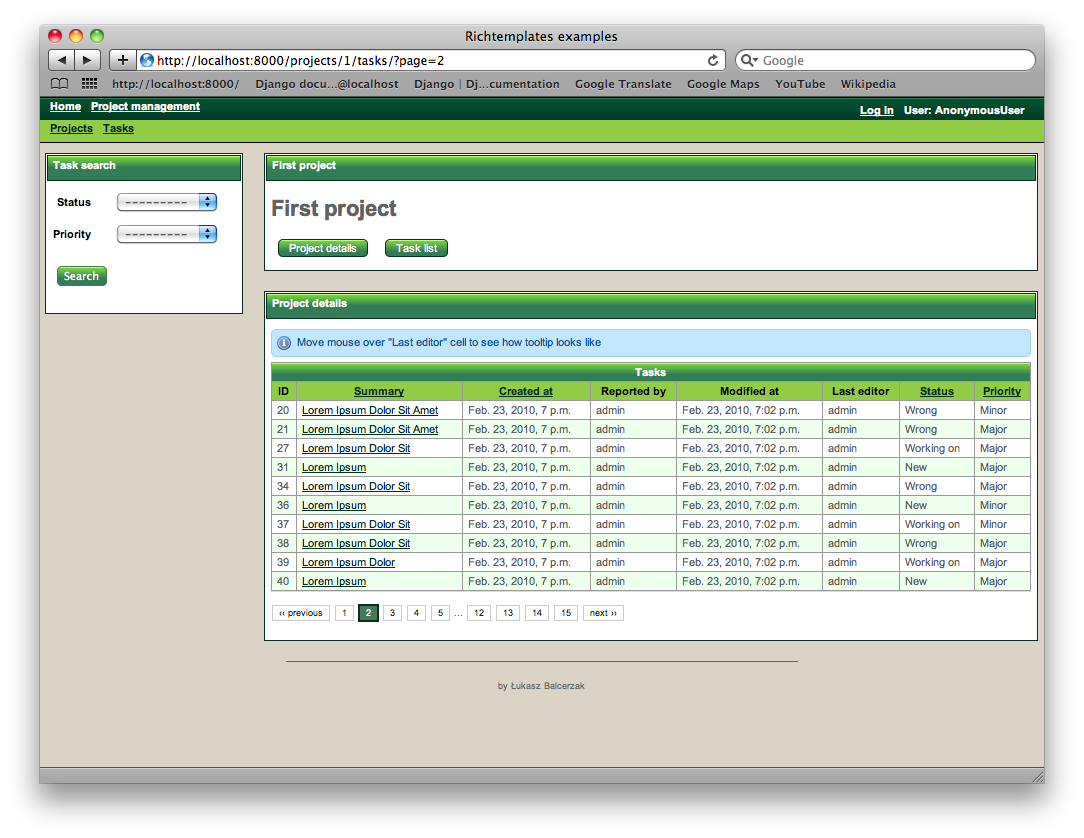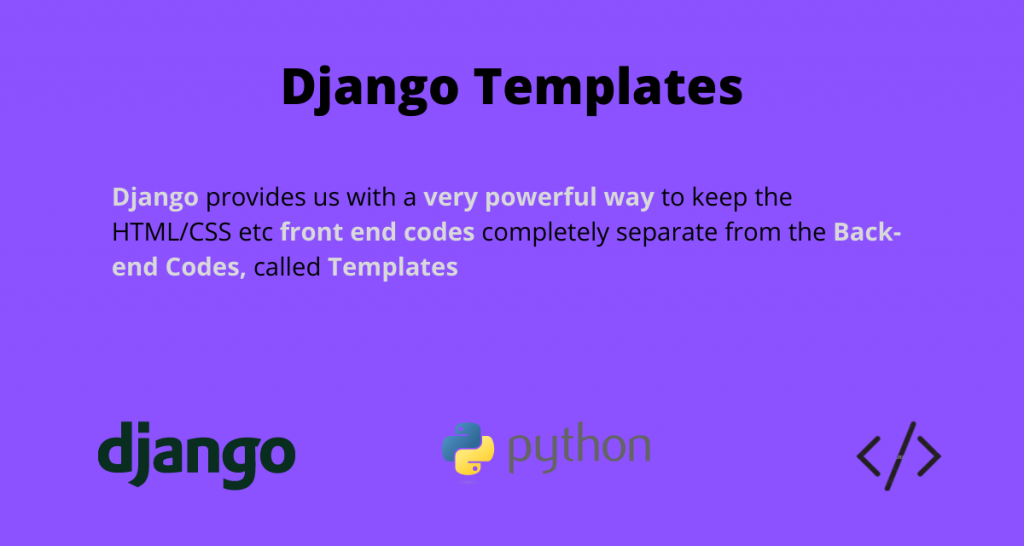Django Template Comment
Django Template Comment - This template is expected to be in the directory includes/django_comments_xtd/, and it provides a way to customized the look of the. Now suppose, you have an app ( blog) with a model ( post ) to which you want to attach. Web django comment blocks. Web templates can be maintained by anyone with an understanding of html; No knowledge of python is required. To comment out a block of code in a django template, use the {% comment %} and {% endcomment %} tags and pass the code to. Some constructs are recognized and interpreted by the template. Web comment description you can add a message to your comment, to help you remember why you wrote the comment, or as message to other people reading the code. By default, django looks for templatetags directory within the apps folder. Web the easiest way to display a list of comments for some object is by using render_comment_list:
Now suppose, you have an app ( blog) with a model ( post ) to which you want to attach. Web class postcommentcreateview (loginrequiredmixin, createview): Create a form to submit comments and validate the input data. Create a model to save the comments. Comment ignores everything between {% comment %} and {%. {% comment %} greetings!</h2> {% endcomment %} run example » definition and usage the. Web comment description you can add a message to your comment, to help you remember why you wrote the comment, or as message to other people reading the code. This template is expected to be in the directory includes/django_comments_xtd/, and it provides a way to customized the look of the. Add a view that processes the form and saves the new. User = models.foreignkey (user_info) blog = models.foreignkey (blog) parent = models.foreignkey ('self', null=true) comment =.
This template is expected to be in the directory includes/django_comments_xtd/, and it provides a way to customized the look of the. See template inheritance for more information. Web creating custom template tag. Web documentation, comments, and docstrings should be wrapped at 79 characters, even though pep 8 suggests 72. Web class postcommentcreateview (loginrequiredmixin, createview): Now suppose, you have an app ( blog) with a model ( post ) to which you want to attach. {% render_comment_list for [object] %} for example: Add a view that processes the form and saves the new. Web example of using the comments app. Web block defines a block that can be overridden by child templates.
Django Template For Loop / Django Templates Learn To Create Your First
For introductory material, see templates topic guide. Web documentation, comments, and docstrings should be wrapped at 79 characters, even though pep 8 suggests 72. Follow the first three steps of the quick start guide. No knowledge of python is required. To comment out a block of code in a django template, use the {% comment %} and {% endcomment %}.
Django Template If
User = models.foreignkey (user_info) blog = models.foreignkey (blog) parent = models.foreignkey ('self', null=true) comment =. Web class postcommentcreateview (loginrequiredmixin, createview): Web creating custom template tag. Comment ignores everything between {% comment %} and {%. For example, this template would render as 'hello':
Django Templates Using Templates to Render Django Views
Web example of using the comments app. Comment ignores everything between {% comment %} and {%. Web block defines a block that can be overridden by child templates. Web class postcommentcreateview (loginrequiredmixin, createview): User = models.foreignkey (user_info) blog = models.foreignkey (blog) parent = models.foreignkey ('self', null=true) comment =.
Django Templates The Comprehensive Reference Guide AskPython
For example, this template would render as 'hello': {% render_comment_list for [object] %} for example: For introductory material, see templates topic guide. Create a model to save the comments. User = models.foreignkey (user_info) blog = models.foreignkey (blog) parent = models.foreignkey ('self', null=true) comment =.
Django Template For Loop python How to change django wagtail's
For introductory material, see templates topic guide. See template inheritance for more information. Follow the first three steps of the quick start guide. {% comment %} greetings!</h2> {% endcomment %} run example » definition and usage the. Web class comment (models.model):
42 with django template Template
To comment out a block of code in a django template, use the {% comment %} and {% endcomment %} tags and pass the code to. Web insert a comment in the django code: Web templates can be maintained by anyone with an understanding of html; Model = comment form_class = commentform def form_valid (self, form): Web comment description you.
[Django教學5]Django Template(樣板)開發快速上手
See template inheritance for more information. Web example of using the comments app. Web insert a comment in the django code: Web comment description you can add a message to your comment, to help you remember why you wrote the comment, or as message to other people reading the code. Web django comment blocks.
27Django Template YouTube
Follow the first three steps of the quick start guide. Model = comment form_class = commentform def form_valid (self, form): Now suppose, you have an app ( blog) with a model ( post ) to which you want to attach. Web from django.shortcuts import render def home (request, template): Web class comment (models.model):
GitHub ansible/djangotemplate A Django project template for Ansible
Add a view that processes the form and saves the new. Now suppose, you have an app ( blog) with a model ( post ) to which you want to attach. User = models.foreignkey (user_info) blog = models.foreignkey (blog) parent = models.foreignkey ('self', null=true) comment =. {% comment %} greetings!</h2> {% endcomment %} run example » definition and usage the..
Django Template For Loop / Django Templates Learn To Create Your First
Web the easiest way to display a list of comments for some object is by using render_comment_list: Create a model to save the comments. For introductory material, see templates topic guide. Add a view that processes the form and saves the new. Web django comment blocks.
Web Comment Description You Can Add A Message To Your Comment, To Help You Remember Why You Wrote The Comment, Or As Message To Other People Reading The Code.
Web example of using the comments app. This template is expected to be in the directory includes/django_comments_xtd/, and it provides a way to customized the look of the. Some constructs are recognized and interpreted by the template. To comment out a block of code in a django template, use the {% comment %} and {% endcomment %} tags and pass the code to.
Web Creating Custom Template Tag.
{% render_comment_list for [object] %} for example: Web insert a comment in the django code: User = models.foreignkey (user_info) blog = models.foreignkey (blog) parent = models.foreignkey ('self', null=true) comment =. See template inheritance for more information.
Web From Django.shortcuts Import Render Def Home (Request, Template):
Create a model to save the comments. Web class postcommentcreateview (loginrequiredmixin, createview): Web and apparently it is working but when i try to make a comment in the admin site of django it forces me to put a parent to each comment (and this is not obligatory. Web the easiest way to display a list of comments for some object is by using render_comment_list:
Web Django Comment Blocks.
Model = comment form_class = commentform def form_valid (self, form): Web block defines a block that can be overridden by child templates. Comment ignores everything between {% comment %} and {%. Follow the first three steps of the quick start guide.






![[Django教學5]Django Template(樣板)開發快速上手](https://1.bp.blogspot.com/-7_udsqngJcU/XnIbhJ2L9WI/AAAAAAAABkQ/1RBZUz8OCbQQT9_sAFCw5-5AUEo_kjxSwCLcBGAsYHQ/w1200-h630-p-k-no-nu/django_template.jpg)

